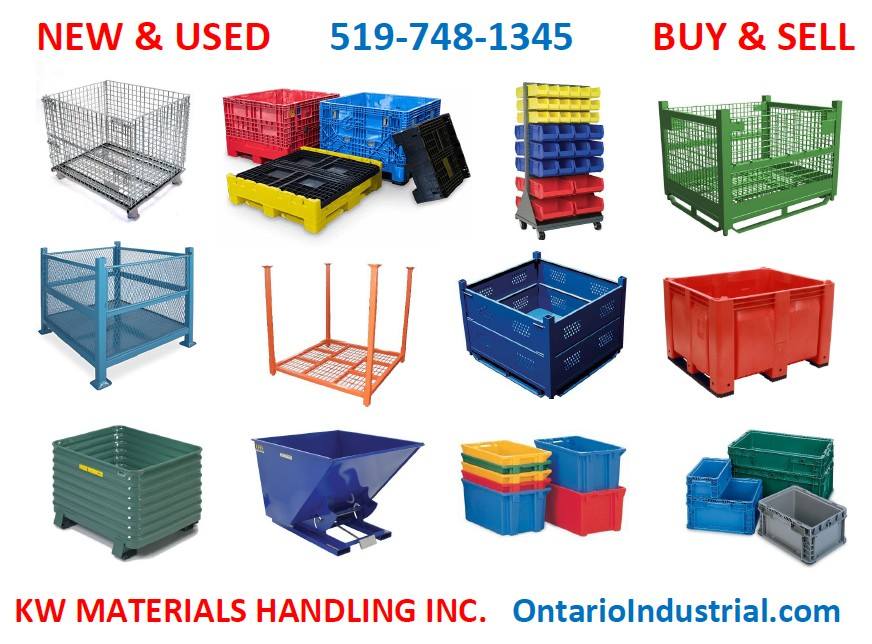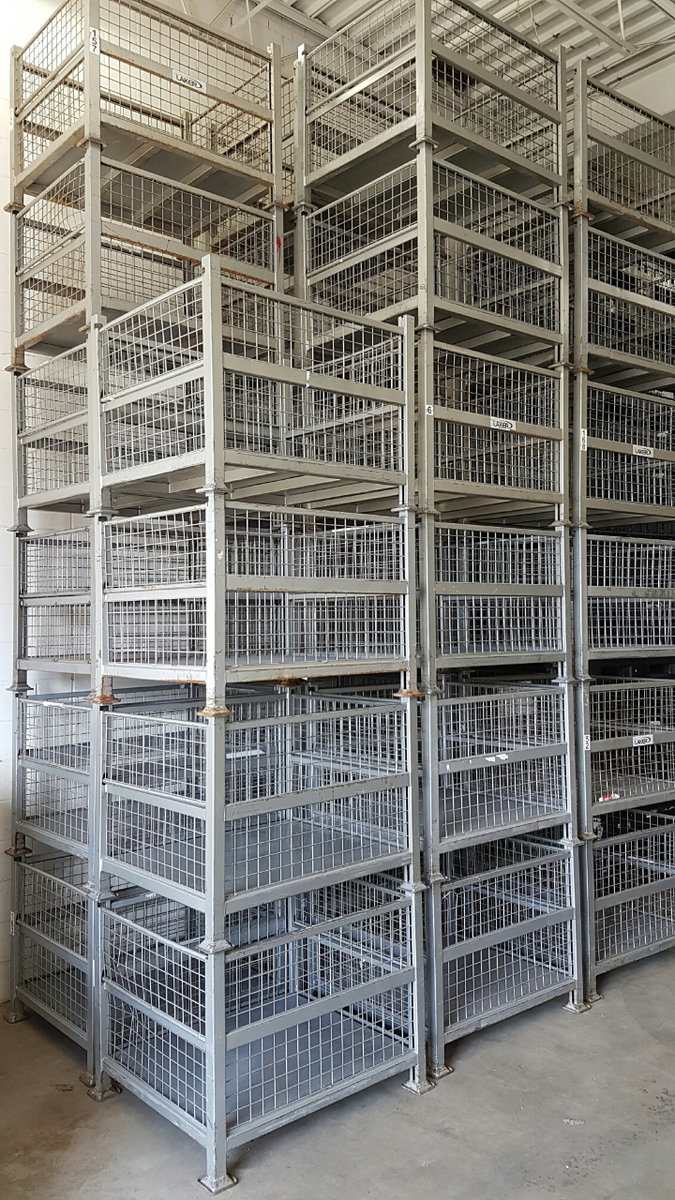Why Mass Containers Are Essential for Lasting and Affordable Transport
Bulk containers play a necessary duty in modern-day logistics. They facilitate the reliable movement of big amounts of products, consequently maximizing transport processes. This method not just decreases prices yet additionally reduces ecological effect with lower exhausts and waste generation. As industries seek even more sustainable techniques, the fostering of mass containers is ending up being progressively significant. What implications does this shift hold for future logistics and supply chain administration?

The Benefits of Making Use Of Bulk Containers in Logistics
Bulk containers reinvent logistics by enhancing effectiveness and sustainability. These containers enable the transportation of large quantities of products in a single trip, substantially lowering the variety of trips required. This not just improves procedures yet likewise lessens labor expenses related to handling, packing, and dumping. In addition, bulk containers are developed to optimize space usage within transport lorries, making sure that more products can be shipped at the same time.
The standardization of mass containers likewise simplifies the logistics procedure. With consistent measurements, they can be quickly stacked and stored, causing boosted storehouse monitoring. Mass containers typically include sturdy materials that protect components from damages during transit, thus decreasing product loss and boosting overall reliability. As an outcome, organizations can experience boosted supply chain performance, ultimately bring about boosted profitability and customer complete satisfaction. This mix of aspects makes mass containers a critical possession in modern-day logistics.
Ecological Effect: Reducing Waste and Carbon Impact
As sectors increasingly focus on sustainability, the fostering of bulk containers has arised as a key technique for decreasing waste and lowering carbon impacts. These containers reduce using product packaging materials, such as boxes and plastic, consequently especially reducing general waste generation. By settling shipments, mass containers enhance transportation performance, enabling more items to be transported per trip. This reduction in journeys directly associates with lower greenhouse gas exhausts, adding to a smaller carbon footprint.
Bulk containers can typically be recycled or recycled, further reducing environmental influence. The longevity of these containers warranties they can endure multiple transport cycles, decreasing the demand for single-use choices. used bulk containers. By enhancing logistics and advertising effective source use, bulk containers not only support lasting practices however additionally encourage industries to align with international ecological goals. Eventually, their application shows a commitment to environmental stewardship and accountable source monitoring
Price Cost Savings: How Bulk Containers Lower Transport Expenses
While several business look for ways to improve their bottom line, the usage of mass containers offers a substantial possibility for reducing transportation costs. Mass containers make best use of the quantity of products delivered, enabling businesses to deliver larger amounts at the same time. This efficiency minimizes the number of journeys needed, straight reducing fuel costs and minimizing labor expenses connected with loading and discharging.
Additionally, mass containers frequently include streamlined designs that optimize space usage within transport vehicles. This implies less voids, resulting in more efficient use of available capacity. In addition, the durability of bulk containers can lower the danger of product damage during transportation, making certain and lowering losses that even more items get here intact.
Enhancing Supply Chain Performance With Mass Storage Solutions
Bulk storage space options play an important duty in enhancing supply chain effectiveness by optimizing stock monitoring. By settling items right into fewer, larger containers, services can significantly decrease handling prices connected with constant transfers and processing. This structured strategy permits for better tracking and administration of supply, ultimately bring about improved functional efficiency.
Streamlined Inventory Management
Efficient stock management is crucial for optimizing supply chain operations, specifically when companies embrace bulk storage space solutions. These options make it possible for organizations to preserve greater supply degrees while decreasing the regularity of replenishment. By settling products into bulk containers, companies can enhance their inventory procedures, decreasing the intricacy related to tracking numerous smaller sized bundles. This technique helps with accurate stock counts and boosts projecting precision, enabling even more enlightened decision-making. On top of that, bulk storage space solutions simplify storehouse company, making it simpler to locate and accessibility items when required. Consequently, companies can accomplish an extra effective stock turnover price, ultimately boosting overall supply chain efficiency and reducing the probability of stockouts or overstock scenarios.

Decreased Handling Costs
The execution of mass storage options not just simplifies inventory monitoring yet additionally substantially minimizes taking care of costs across the supply chain. By consolidating materials into bulk containers, business minimize the need for frequent handling and transfer in between various storage space and transport devices. This method cuts down on labor costs connected with loading, dumping, and moving smaller sized plans. Additionally, bulk storage space lowers the frequency of deliveries, bring about reduced transportation expenses and reduced gas consumption. Because of this, companies can optimize their logistics procedures, enabling a more reliable allowance of resources. Ultimately, minimized taking care of prices add to improved general supply chain efficiency, you can find out more promoting a setting that supports both sustainability and economic practicality.

Versatility of Bulk Containers Throughout Numerous Industries
Although many industries have unique needs for transport and storage, mass containers have actually arised as a functional option that meets a wide variety of needs. These containers, varying from huge bins to specialized storage tanks, can fit diverse products, consisting of fluids, powders, and granules. In the agricultural field, bulk containers help with the transport of plant foods and grains, while the food and drink industry uses them for ingredients and ended up items. The chemical market counts on bulk containers for safely transferring harmful products, guaranteeing conformity with safety policies. Additionally, construction firms take advantage of mass containers for transporting aggregates and other products. Their adaptability reaches various modes of transport, consisting of trains, vehicles, and ships, improving logistical efficiency. This flexibility not only streamlines operations across various markets however likewise advertises sustainability by minimizing product packaging waste and enhancing space en route. Mass containers play a crucial duty in contemporary supply chain administration.
Future Trends in Mass Container Use and Sustainability
The future of mass container use is increasingly shaped by innovative products growth that boosts sustainability. Furthermore, automation in logistics assures to simplify procedures, reducing waste and enhancing effectiveness. Welcoming round economy practices will certainly even more reinvent exactly how bulk containers are developed, used, and recycled, cultivating a more sustainable transport landscape.
Innovative Materials Growth
As markets increasingly focus on sustainability, innovative materials advancement in mass containers becomes a considerable element in improving eco-friendly transportation remedies. Researchers and makers are discovering naturally degradable plastics, recycled composites, and lightweight steels to lower ecological influence. These products not just decrease waste yet likewise improve fuel effectiveness by decreasing the general weight of containers. Furthermore, innovations in smart products, which can adjust to differing problems, boost the sturdiness and functionality of bulk containers. The combination of these innovative products straightens with round economy principles, promoting reuse and recycling. As the need for sustainable practices grows, the advancement of such products will play a crucial function in shaping the future of mass container use in logistics and transport.
Automation in Logistics
Significant developments in automation are positioned to change logistics and the application of bulk containers, enhancing sustainability in transport. Automated systems, including drones and self-governing cars, are enhancing the movement of bulk containers, decreasing the reliance on typical fuel-powered transport. These modern technologies enhance transmitting and loading processes, enhancing and minimizing vacant miles fuel efficiency. In addition, automated stock administration systems enhance tracking and tracking of mass containers, guaranteeing far better source allocation and reduced waste. The assimilation of the Net of Things (IoT) allows real-time data evaluation, enabling positive decision-making that aligns with sustainability goals. As automation remains to progress, it is anticipated to drive additionally technologies wholesale container usage, eventually sustaining more sustainable logistics techniques and reducing the environmental effect of transport.
Round Economy Practices
Developments in automation are establishing the phase for an extra integrated method to circular economy techniques in the domain name of bulk container use. As industries increasingly welcome sustainability, bulk containers are being designed for durability and reusability. This shift not only minimizes waste but additionally boosts resource efficiency. Business are use this link taking on techniques such as closed-loop systems, where made use of containers are collected, refurbished, and reintroduced into the supply chain. Furthermore, wise modern technologies track container life cycles, helping with much better administration and decreasing environmental effect. The cooperation in between makers, logistics suppliers, and end-users is important in developing criteria for sustainable container usage. used collapsible bulk containers. Future trends suggest an expanding emphasis on materials that are recyclable and biodegradable, further enhancing the round economic climate's concepts wholesale transportation

Often Asked Concerns
What Materials Are Bulk Containers Generally Made From?
Bulk containers are typically constructed from sturdy products such as high-density polyethylene, light weight aluminum, steel, and cardboard. These materials offer stamina, protection, and flexibility, making them ideal for carrying different products in different markets successfully.
Just how Do I Pick the Right Size Mass Container?
Choosing the right dimension bulk container includes evaluating the quantity of products to be transferred, thinking about managing equipment compatibility, and evaluating storage room requirements. Correct size warranties effectiveness in their website transportation and decreases waste during shipment.
Are Mass Containers Reusable or Recyclable?
Mass containers are frequently multiple-use, designed for numerous trips, boosting sustainability. Numerous can likewise be recycled, depending upon the products utilized. Choosing recyclable options better minimizes and supports environmental goals waste in transportation methods.
What Security Rules Put On Mass Container Transport?
Safety and security laws for mass container transportation include compliance with the Department of Transportation guidelines, correct labeling of harmful products, structural stability analyses, and adherence to weight limits to guarantee secure handling and stop accidents throughout transportation.
How Can Businesses Transition to Using Mass Containers Successfully?
Services can transform to bulk containers by examining existing logistics, training team on handling, investing in suitable devices, enhancing inventory administration, and working together with distributors to assure compatibility and effectiveness throughout the supply chain.
As markets progressively focus on sustainability, the adoption of bulk containers has actually emerged as a vital approach for minimizing waste and reducing carbon footprints. By consolidating products into mass containers, firms can improve their inventory procedures, minimizing the intricacy linked with tracking several smaller plans. As markets significantly prioritize sustainability, ingenious materials growth in mass containers emerges as a significant factor in improving environmentally friendly transport remedies. Automated systems, including drones and autonomous cars, are simplifying the activity of bulk containers, lowering the dependence on conventional fuel-powered transport. Additionally, automated stock management systems boost tracking and surveillance of bulk containers, ensuring better resource appropriation and minimized waste.